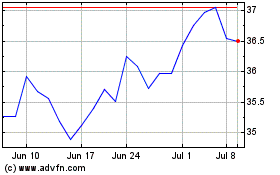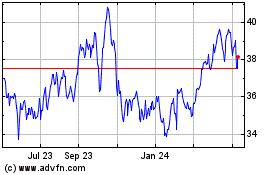BP Boss Calls for Climate-Change Action at Oil Conference
February 10 2016 - 12:40PM
Dow Jones News
LONDON—BP PLC Chief Executive Bob Dudley called on governments
Wednesday to do more to encourage a shift to lower-carbon fuels,
warning that the world is on course to see global temperatures rise
to dangerous levels.
Mr. Dudley was joined in his call for climate-change action by
other energy-industry officials at International Petroleum Week,
the first major western oil-sector conference since global leaders
met in Paris in December to set carbon-reduction targets.
"The path to 2 degrees Celsius and below requires emissions to
fall starting now," Mr. Dudley told the industry conference in
London, referring to the increase in temperature that many
scientists say will lead to rising sea levels and other adverse
environmental changes.
Europe's biggest energy companies have become vocal in recent
years about extending the sort of taxes on fossil fuels that exist
in the European Union to other parts of the world, including the
U.S. and China. Such measures would likely cut down on heavily
polluting coal, while increasing the use of natural gas—a product
the oil companies increasingly sell.
Extracting and burning oil, coal, gas and other fossil fuels is
so cheap that a government-imposed price on carbon is needed to
support the climate-change pledges made in Paris, said Shell's
chief climate change adviser David Hone at a panel here.
With the elite of the world's oil companies and traders gathered
in London, BP unveiled its latest energy outlook for the next 20
years, saying the increase in carbon emissions will slow sharply
over the coming years, but will still increase by around 0.9% a
year to 2035.
That is less than half of the 2.1 % emissions growth seen in the
past 20 years, BP said.
Overall the company sees global energy demand increase 34% until
2035, driven by economic growth in emerging markets like China and
India.
Fossil fuels will still make up 80% of global energy supply in
the same time period, but their mix will change. Natural gas is the
fastest growing at 1.8% a year, BP said, while coal's share of the
energy mix will hit an all-time low in 2035.
BP said governments should impose tougher vehicle-fuel
efficiency standards and create incentives for consumers to buy
smaller vehicles to slow down the growth of greenhouse gases.
BP's chief economist, Spencer Dale, said policy makers should
set a carbon price of $100 a ton for in leading economies.
"The nice thing about the carbon price is that you don't ask
policy makers to try and pick winners and losers for the next 20
years," he said.
"We know economics 101 if you want to ration something normally
the best way of doing that is to stick a price on it and then let
the market find the most efficient way," he added.
Miriam Malek contributed to this article.
Write to Neanda Salvaterra at neanda.salvaterra@wsj.com and
Sarah Kent at sarah.kent@wsj.com
(END) Dow Jones Newswires
February 10, 2016 12:25 ET (17:25 GMT)
Copyright (c) 2016 Dow Jones & Company, Inc.
BP (NYSE:BP)
Historical Stock Chart
From Mar 2024 to Apr 2024

BP (NYSE:BP)
Historical Stock Chart
From Apr 2023 to Apr 2024
